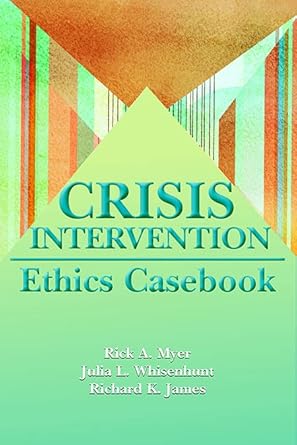封面
Crisis Intervention Ethics Casebook
作者 Rick A. Myer (Author), Julia L. Whisenhunt (Author), Richard K. James (Author)
The fast-paced, unpredictable, and high-risk nature of crisis intervention creates critical ethical dilemmas that can result in personal harm and professional liability if not handled appropriately. Applying a traditional model of ethical decision-making is often impractical when time is limite and decisions must be made quickly. This counseling tool kit offers a new operational approach for integrating ethical decision-making in crisis intervention. Following detailed discussions of crisis intervention within the framework of realtional-cultural theory, a triage assessment system, and an original ethical decision-making protocol, nine diverse case studies in hospital, telebehavioral health, school, clinical, and public settings are presented. Students and practitioners will build a repertoire of ethical decision-making skills to de-escalae crisis incidents and provide an appropriate level of support to individuals experiencing crisis.
*Requests for digital versions from ACA can be found on www.wiley.com
*To purchase print copies, please visit the ACA website
*Reproduction requests for material from books published by ACA should be directed to publications@counseling.org
-
作为一名新手咨询师,通过提问的方式学习《Crisis Intervention Ethics Casebook》的内容可以非常有效。以下是一些具体的步骤和建议,帮助你通过提问来深入理解和应用书中的知识:
1. 明确学习目标
在开始之前,明确你希望通过学习本书达到什么目标。例如:
- 理解危机干预的基本概念和历史。
- 掌握危机干预中的伦理原则。
- 学会在实际工作中应用这些伦理原则。
- 提高评估和处理危机情境的能力。
2. 分章节阅读和提问
将书分成几个部分,逐章阅读并提出问题。以下是每个章节可以提出的问题示例:
第一章:危机干预的历史背景
- 危机干预是如何发展的?
- 早期的危机干预模式有哪些?
- 当前的危机干预模式有哪些主要特点?
第二章:伦理原则的应用
- 行善、不伤害、自主、忠诚、公正和诚实的具体含义是什么?
- 这些伦理原则在危机干预中如何具体应用?
- 在实际工作中,如何平衡这些伦理原则?
第三章:评估方法
- 危机干预中常用的评估工具有哪些?
- 如何进行有效的分类评估?
- 多样性和文化敏感性在评估中的重要性是什么?
第四章:具体案例研究
- 案例研究中涉及的主要伦理问题是什么?
- 案例中的干预措施是否合理?为什么?
- 如果是你,你会如何处理这个案例?
第五章:危机干预的技术与策略
- 常见的危机干预技术有哪些?
- 如何选择合适的干预策略?
- 在实际工作中,如何灵活运用这些技术?
第六章:法律与政策
- 危机干预中需要遵守的主要法律法规有哪些?
- 如何确保你的工作符合法律要求?
- 法律和政策在危机干预中的作用是什么?
第七章:危机干预的未来趋势
- 未来危机干预的发展方向是什么?
- 新技术如何影响危机干预?
- 作为咨询师,如何适应未来的趋势?
3. 反思和讨论
- 反思:每次读完一个章节后,花时间反思你学到的内容。你可以写一份简短的总结,或者在笔记本上记录下你的思考。
- 讨论:与同事或导师讨论你所学的内容。通过讨论,你可以获得不同的视角和反馈,进一步深化理解。
4. 应用和实践
- 模拟练习:尝试模拟一些危机情境,运用你在书中学到的知识和技巧进行干预。
- 案例分析:选择一些实际的案例,分析其中的伦理问题,并提出你的解决方案。
5. 持续学习
- 定期复习:定期回顾你所学的内容,巩固记忆。
- 参加培训:参加相关的培训和研讨会,不断更新你的知识和技能。

